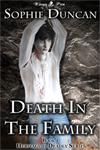Hi everyone! Today we have something a a treat: a guest-post from the talented author Sophie Duncan. Thanks for visiting, Sophie!
Thanks to Leonard for hosting me today.
Feedback - Taking It - Giving It - Enjoying It
O feedback, glorious and treacherous love of my life.
Okay, so maybe that was a bit melodramatic, but any writer who says they don't love feedback is telling fibs. Any writer who says they aren't nervous about feedback is also probably not being totally honest either, because, like the Sword of Damocles, it swings above our egos ready to plunge down with the fatal stab of 'the one star review'. The old advice for authors never to read reviews is probably the best advice going, but, if, like me, you really can't leave well alone, then read on for my thoughts on the subject.

I'm both a writer and an avid reader, and since I have started publishing books, I have to say it has made me a more considerate reviewer. This doesn't mean I only put nice things in reviews, it means I actually think about reviewing a book that I have read. I don't need Amazon's auto-generated emails to ask me to go and review my purchases any more, I do it actively, because I know how much decent reviews mean to writers, especially those of us just starting out. I'm a Brit, I like to be nice, polite, it's the way I was brought up, so I don't go in for scathing reviews, but I do give what I hope is constructive criticism, i.e. I explain why I gave a book the rating I gave it. Naming no names in this post, but you can go and see my reviews on GoodReads and Amazon.co.uk if you're interested, there was one book which I gave 3 stars because I liked the story, but the author's attempt to set the scene in Scotland with a university post-grad failed because he didn't know the university system in the UK and, it being a murder mystery, he also didn't understand the police system in Scotland. Neither problem stopped me reading the book, although, if I was reading it in company my companions sometimes got an 'OMG No!' or a 'Not Like That!' running commentary, but it was a fun read and I recommended he get a Brit Picker for his book.
I have also left a 4 star review for a book I didn't finish and, before you start stamping and yelling at me for falsifying a review, let me explain. I found the book by browsing Amazon, I tried out the book and I got a significant way through it. However, despite knowing on an intellectual level that the book was well written and engaging, I just did not gel with the story or the characters, but I knew other people would. I was not going to penalise the author because the book wasn't to my taste and I thought it deserved recommending to those friends of mine who I knew would enjoy it.
Then there are the books I genuinely can't stop raving about, I'll post far and wide to let all my friends and acquaintances know I'm in love with a set of books. If you've been reading my other blog tour posts then you may have spotted one such set of supernatural books, since I've referenced them a couple of times. I even wrote fanfic for them!

I don't expect authors to get in touch about my reviews, but if they do, I don't mind engaging with them, since I never put anything in a review I am not happy to stand behind, after all, I'm not a troll. As an author, I don't generally engage with my reviewers, not on places like Amazon and Smashwords, except for maybe 'liking' the odd favourable review :). I do read my reviews, sorry, for those of you tutting, I'm am no where near famous enough, nor do I have nearly enough reviews to engage that professional detachment I'm supposed to develop. I like reading a good review, it makes me feel good, it gives me encouragement. I also read the bad reviews as well. Only one has made me want to spit tacks, because, well, it wasn't about the book, it was an objection to the fact I included same-sex romance in the book, the person even said they liked the story, but still gave me a 1-star because of the 'gay sex' of which there was none. Now, there's a mechanism on Amazon for getting 'malicious' reviews removed, and I might have had grounds, but I stepped back, I took a deep breath and I did not get involved. And, y'know what, it actually turned out to be a good thing, because I then had a collection of reviews from other readers with various levels of support for the book pointing out how wrong that review was. So, lesson learned, it didn't stop me from reading reviews, but it did underline the fact that, as the author, I should leave well alone.

Since we're talking about reviews, I'm going to touch on the fizzling issue of fake reviews that raised it's head again recently thanks to the NYTimes article on the subject. For those of you who haven't read it, the article interviews an entrepreneur who set up a company selling reviews to authors for a price, e.g. for $1000 he would provide fifty reviews for your book. This is not a new story, fake reviews have been around for as long as the review system has been there (please don't try and tell me 'professional' critics can't be influenced), but the internet has provided a scale of fakery unparalleled in history. There are also author groups where authors can trade reviews, some which maintain that the reviews must be 5-star. I'm going to put my stake in the ground here and say, this kind of thing depresses me utterly. I'm not talking here about authors who read other author's work and genuinely like it (I'm one of those, I don't expect anything for my review, even if the person is my friend, I don't feel obliged to be glowing in my review), I'm talking here about money or favours (i.e. an equivalent good review) being exchanged for good reviews. It's deplorable, pointless and undermines the system of customer reviews.
Some commentators have been suggesting that this has broken the system to the point where it's useless, but I don't agree. There are always those who try to beat the system, skew it their way, money does talk in all walks of life, but I don't think that means those of us who want to be honest and share our views should give up. In fact, the more of us that there are, the better. I encourage every genuine reader who has liked or disliked a book to go out there and leave their opinion. It doesn't have to long, it doesn't have to be a glowing endorsement, it just has to be your thoughts. I know, as a writer, I'm always grateful just to know someone is reading my books.

Leaving behind stars and reviews, that is not the only thing feedback is about. I come from a fanfic background and one of the things I really enjoy is discussing my work with an interested reader. There's nothing quite like chewing over the cud of your characters' motivations and your plot decisions with someone who is willing to challenge them and ask 'why'. For a start, it's nice to know someone took the time to read the story and then for them to consider enough of it to actually want to ask questions, well, it's an ego boost and it's fun. It's not something I get a lot of chance to do with my published work, well, not yet, here's to hoping that sometime in the future I'll make some contacts with book clubs and the like interested in these kinds of exchanges. I think these kinds of conversations are useful for a writer, because, sometimes, a perspective comes through that you'd never thought of, which can all be grist to the writing mill.
So, may I finish by saying thank you to everyone who has ever left a genuine review. You are stars, you have the gratitude of writers everywhere. We are a delicate bunch, our egos appreciate the boost and our drives for perfection need the criticism. Thank you for sharing.
Sophie Duncan
Sophie was born with the writing bug in her blood, boring her primary school teachers with pages of creative writing and killing her first typewriter from over use when she was thirteen. She began publishing her work on line while at university where she discovered the internet and fanfiction. It took another decade for Sophie to realise her long-time dream of releasing her own original fiction as an author through Wittegen Press.
Death In The Family (Heritage is Deadly #1)
Leaving a good London school with solid prospects, Tom Franklin has the world at his feet. Yet one thing has always haunted his perfect life: his dreams. When Tom discovers that the nightmarish images of dark places and even darker instincts are in fact repressed memories from his early childhood, he must face the heritage from his birth-father, a savage vampire known only as Raxos.
Realising his memories are his only hope of controlling his awakening instincts, Tom returns to, Coombedown, the sleepy, Cornish village in which he was born, unknowing that the night-breed in his veins will lead him into danger.
Death In The Family is a young adult, paranormal novel.
Death In The Family Literary+ Blog Tour Schedule:

Literary+ is a marketing initiative which was founded and led by Shen Hart. This is a time of evolution and progress, the market is being opened up to e-books and self-publication. As a fellow writer, Shen understands that self-publication is a hard and often lonely road. She started Literary+ to bring together authors and related creative specialities with the goal of helping each other. With a tight knit, friendly and welcoming community at its core, Literary+ holds a strong focus on marketing. As Literary+ continues to grow and evolve it will use innovating, original and experimental marketing methods and schemes to get its member’s books into their reader’s hands.













